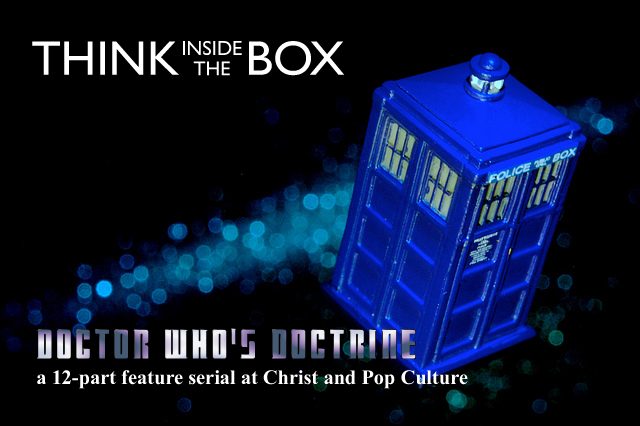On Christ and Pop Culture: Doctor Who’s Doctrine
Exactly fifty days now until the Doctor Who 50th anniversary special, The Day of the Doctor, Christ and Pop Culture is three parts into a 12-part series exploring Doctor Who’s Doctrine.
I’m blessed to assemble and help edit that series, titled after a phrase I first began using on SpecFaith.1
We want to explore Doctor Who’s stories, characters, themes, Christianity vs. humanism, romance, visuals and music, and of course proven fandom since the program’s 2005 restart.
Here I’d also love to hear SpecFaith readers’ reasons for loving Who. More on that later.
Doctor Who’s Doctrine, Part 1: Mad Man with a Box
 This series intro by me includes one of the worst puns by a Christian Doctor Who fan ever, or perhaps simply one of the worst puns ever: “Zeal for your Whos has consumed me.”
This series intro by me includes one of the worst puns by a Christian Doctor Who fan ever, or perhaps simply one of the worst puns ever: “Zeal for your Whos has consumed me.”
When I was a child, I thought like a child and enjoyed Christian programs for children. Those included the Christian Broadcasting Network’s anime TV series Superbook, in which children travel in a whirling “time vortex,” and Adventures in Odyssey, whose stories often included a time machine-like device shaped (at first) like a phone box.
Now that I’ve grown, I don’t put away these childish things. Also, I enjoyed finding what may have been their inspiration.
Doctor Who’s Doctrine, Part 2: Genre Roots
 My friend Royce Hunt wrote this; he loves classic Who and out-geeks most other fans. And yes, that’s him in the Fourth Doctor cosplay, including his wife’s handmade ten-foot scarf.
My friend Royce Hunt wrote this; he loves classic Who and out-geeks most other fans. And yes, that’s him in the Fourth Doctor cosplay, including his wife’s handmade ten-foot scarf.
An instant fan, I watched the classic Doctor Who series until PBS stopped running the show in 1992. To me, only that series has lasted through time, sparking the imaginations of children and adults on account of great story writing—but also thanks to some creative plagiarism.
Yes, classic Who fans who also know science fiction novels will find that Doctor Who stories aren’t that original. Some are even blatant rip-offs. How does that affect the show’s stories?
Doctor Who’s Doctrine, Part 3: Exterminating Evil
 From CAPC editor Jason Morehead, this recent episode briefly explores the Doctor’s conflict with enemies such as the Daleks, before emphasizing the Doctor’s own challenging nature:
From CAPC editor Jason Morehead, this recent episode briefly explores the Doctor’s conflict with enemies such as the Daleks, before emphasizing the Doctor’s own challenging nature:
When you first meet the Doctor, in any of his incarnations, he seems like a walking bag of eccentricities, from his fashion sense to his mannerisms. But what has been part of the revival’s brilliance is its revelations that the Doctor, for all his brilliance and derring-do, is a shell of an alien. All his eccentricities actually conceal a demi-god who verges on breakdown, and he’s certainly more than the benevolent-yet-eccentric savior we may think. He’s a “mad man with a box” — and the emphasis is on mad.
Coming up
Next on CAPC I’ll write one or two further episodes myself. (Yes, I am beginning to feel like a certain other showrunner Steven [with a V].) We’ll continue exploring the series’s magic, its diversity of fans, the music of Murray Gold, love stories (and sporadic agenda moments), themes borrowed from many religions, and of course the Doctor’s faithful companions.
Lord willing, two weeks before this series’s conclusion before Nov. 23 (Who’s anniversary date), we’ll semi-conclude with a two-parter called Best In Show. It’s for that miniseries that I ask you: What’s your fan “testimony”? What are your favorite Who episodes, story arcs, Doctor actors, companions, musical cues, planets, time eras, visuals, villains, anything? How have you enjoyed God’s beauties and truths through Doctor Who’s beauties and truth?
Your answers here may be included in that two-parter about 1.5 months from now.
And with that request, I definitely feel like Steven “Grand Moff” Moffat, holding contests for people to contribute to a Doctor Who series. One difference: I would tell the truth about whether The Doctor actually dies or if I’ve finished using the Weeping Angels.
- In early July I began contributing to Christ and Pop Culture, which is now a member blog of the Patheos religion-blogs network. Its mission is to explore all of pop culture, including storytelling, music, news, and politics, from a Christian perspective. There I’ve covered Christ-figures in fiction, “faith-based” films and superhero blockbusters, a dash of apologetics, the “romance prosperity gospel,” and Harry Potter vs. Left Behind. ↩











































*squeals of happiness* Thanks for the heads-up. I’m always up for discussion of the Whoniverse from a Christian perspective.
Good luck on the series. I love finding earnest criticism of storytelling, sometimes even when I’m not familiar with the subject.
I began watching the 2005 series. I think I’ve seen about 5 episodes so far. My main problem with the show so far is that I dislike both Rose and the Doctor.
If it’s really sticking, try skipping ahead to Ten or a different companion. Different eras appeal to different people, and there’s nothing wrong with moving around, as long as you at least try.
As a fan of the original series before the “reboot” appeared, I find it most interesting indeed how the show has taken the Doctor from an irascible but cunning Victorianesque gentleman to a clown, a man of action, another clown, a young thoughtful whippersnapper, a misanthropic most unlikeable lout, a zany cosmic traveler — to a wounded, broken Time Lord and then — wait for it — waiiiiiit for it — a Messianic, almost godlike figure/savior in the last two incarnations, and now some fans howl about “not another old guy!” waiting in the wings. The doctrine of Dr. Who in its current state is the Doctor IS a savior/godlike figure. As a Christian I find this troubling and a definite sign of the times, folks……
Why is that troubling? I love finding messianic themes in television shows, and everything else. Of course the writers don’t literally want to depict Christ; of course the “savior” isn’t theologically correct. So what? It just goes to show that really deep and meaningful stories tend to be about saviors, whatever else they may be about. And we know that the true story is actually about a Savior.
I must agree with Bainespal, for these central reasons:
1) Of course pagans like stories about substitute messiahs. It’s what pagans do.
2) However, enjoying the tales of a substitute”messiah” outside yourself, such as The Doctor or any superhero comic or film franchise, is one step closer to the true Hero than accepting a “messiah” within yourself.
3) As the Christ and Pop Culture series has noted and will continue to explore, even humanist writers in trying to reflect Christlike attributes — along with silliness, madness, and deep “you may be just like your enemies”-style flaws — prove anew that they cannot construct a story based solely on the values of classic or cosmic humanism. Their stories certainly include those flourishes and themes. But the central theme of them is of heroes, including the Doctor and his companions, who are willing to sacrifice all, even their lives, to do the right thing. You can only get that from the true myth, Christianity. And by reflecting that truth, Doctor Who‘s writers again prove that despite any of their own twisting of truth, they are still living in God’s universe and can only make things using God’s creation “parts.”
A final and more-minor note: the new series is not a reboot. A reboot would have discarded all previous continuity and opened with the First Doctor all over again.